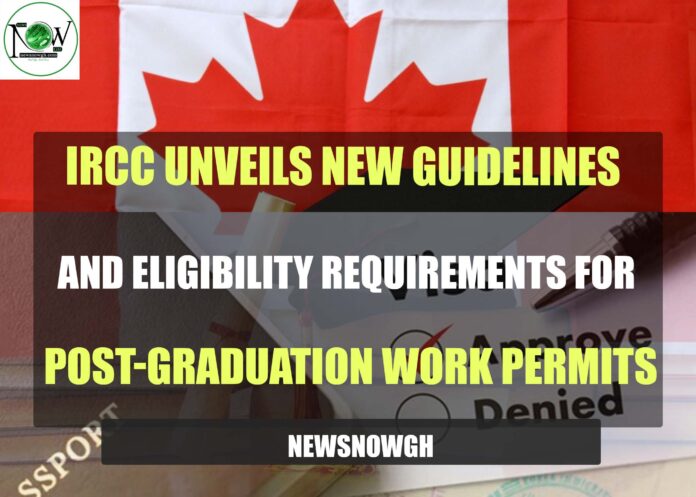IRCC Unveils New Guidelines and Eligibility Requirements for Post-Graduation Work Permits
With effect from November 1, 2024, the IRCC has announced revised eligibility restrictions for the Post-Graduation Work Permit (PGWP). To be eligible, international graduates must fulfill certain language and field of study requirements. Learn about the most recent rules and fields that qualify for PGWPs in Canada.
The Post-Graduation Work Permit (PGWP) eligibility requirements have been amended by Immigration, Refugees and Citizenship Canada (IRCC). The new standards will take effect on November 1st for international graduates. These modifications include language competence criteria and particular field of study requirements for particular programs.
PGWP’s New Field of Study Requirements
International graduates in Canada will need to fulfill new field of study requirements as of November 1 to be eligible for a Post-Graduation Work Permit. The qualifying fields, which concentrate on the demands of the domestic labor market, are modeled after the occupation-based categories included in Canada’s Express Entry system. The following fields are eligible:
- Healthcare
- Agriculture and Agri-Food
- Transport
- Trade
- STEM (Science, Technology, Engineering, and Mathematics)
The Classification of Instructional Programs (CIP), which is comparable to the National Occupation Classification (NOC) for jobs in Canada, is used to classify programs that qualify for PGWP funding. By field, below are a few instances of programs that qualify:
| CIP 2021 Title | CIP 2021 Code | Field of Study Category |
| Agricultural business and management, general | 01.0101 | Agriculture and agri-food |
| Animal/livestock husbandry and production | 01.0302 | Agriculture and agri-food |
| Plant nursery operations and management | 01.0606 | Agriculture and agri-food |
| Animal Health | 01.0903 | Agriculture and agri-food |
| Agronomy and crop science | 01.1102 | Agriculture and agri-food |
| Special education and teaching, general | 13.1001 | Healthcare |
| Exercise physiology | 26.0908 | Healthcare |
| Physical therapy assistant | 51.0806 | Healthcare |
| Polysomnography | 51.0917 | Healthcare |
| Cytotechnology/cytotechnologist | 51.1002 | Healthcare |
| Computer programming/programmer, general | 11.0201 | STEM |
| Chemical engineering | 14.0701 | STEM |
| Engineering Mechanics | 14.1101 | STEM |
| Water, wetlands, and marine resources management | 03.0205 | STEM |
| Computer graphics | 11.0803 | STEM |
| Electrician | 46.0302 | Trade |
| Heating, air conditioning, ventilation, and refrigeration maintenance technology/technician | 47.0201 | Trade |
| Machine tool technology/machinist | 48.0501 | Trade |
| Insulator | 46.0414 | Trade |
| Plumbing technology/plumber | 46.0503 | Trade |
| Heavy equipment maintenance technology/technician | 47.0302 | Transport |
| Air traffic controller | 49.0105 | Transport |
| Truck and bus driver/commercial vehicle operator and instructor | 49.0205 | Transport |
| Engineering Mechanics | 49.0108 | Transport |
| Transportation and materials moving, other | 49.9999 | Transport |
On the official IRCC webpage, applicants can view a more detailed list.
How to Get Your CIP Code
To find your CIP code, do the following:
- Visit Statistics Canada’s CIP 2021 webpage.
- Use keywords to find your program title, or look through the study categories.
- Once the appropriate subcategory has been located, click through to see more detailed program options.
- The last page will describe the educational programs in full, with examples and exclusions to assist you in determining the appropriate CIP code.
PGWP Language Requirements
For PGWP applicants, the IRCC has added language competency requirements in addition to the field of study requirements. These prerequisites change based on the academic level:
- University bachelor’s, master’s, or doctorate in any of the four language fields; CLB 7 (English) or NCLC 7 (French).
- Other university courses: all four language areas’ CLB 7 (English) or NCLC 7 (French), however, the field of study needs to be qualified.
- College programs: Eligibility depends on the field of study; CLB 5 (English) or NCLC 5 (French) are offered in all four language areas.
Graduates who apply for a PGWP after November 1, 2024, must take note of these modifications. The field of study requirements is waived for applicants who submit before this date, although they still need to complete the language requirements.
Overview: Post-Graduation Work Permit (PGWP)
With the PGWP, foreign graduates from qualified Canadian universities can work in Canada and obtain useful job experience. Since it’s an open work visa, graduates can work in Canada for any company.
The PGWP’s tenure is determined by how long the graduate student’s program is, with permits normally lasting anywhere from eight months to three years. Through a PGWP, foreign graduates can obtain Canadian work experience that will assist them in becoming eligible for permanent residence through Canada’s Express Entry system.
Conclusion
The necessity of matching education to language competency and labor market demands is shown by the most recent modifications to PGWP eligibility. Keeping abreast of these standards is essential for foreign graduates who want to contribute to Canada’s expanding economy and land a job.
Follow us on Newsnowgh.com to stay updated on the latest information regarding work permits, visa application processes, paths to permanent residency, and visa-sponsored employment.


